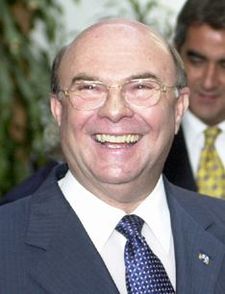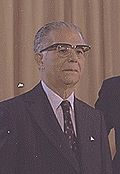
Dominican Republic presidential election, 2000
Encyclopedia

Dominican Republic
The Dominican Republic is a nation on the island of La Hispaniola, part of the Greater Antilles archipelago in the Caribbean region. The western third of the island is occupied by the nation of Haiti, making Hispaniola one of two Caribbean islands that are shared by two countries...
on 16 May 2000. Hipólito Mejía
Hipólito Mejía
Rafael Hipólito Mejía Domínguez is a Dominican politician and former President of the Dominican Republic...
of the Dominican Revolutionary Party
Dominican Revolutionary Party
The Dominican Revolutionary Party is one of the main political parties of the Dominican Republic. It has a moderate centrist position, social democratic in name. The party's distinctive color is white....
(PRD) won the election, defeating Danilo Medina
Danilo Medina
Danilo Medina Sánchez is an economist, engineer and Dominican politician. He was the presidential candidate of the Dominican Liberation Party in the 2000 presidential election, and was defeated by Hipólito Mejía....
of the Dominican Liberation Party
Dominican Liberation Party
The Dominican Liberation Party is one of the main political parties of the Dominican Republic, and has a centrist position.The party has been elected into office thrice now with Leonel Fernández as President of the Dominican Republic in the 1996, 2004 and 2008 elections, though losing in 2000...
(PLD) and former president Joaquín Balaguer
Joaquín Balaguer
Joaquín Antonio Balaguer Ricardo was the President of the Dominican Republic from 1960 to 1962, from 1966 to 1978, and again from 1986 to 1996.-Early life and introduction to politics:...
of the Social Christian Reformist Party
Social Christian Reformist Party
The Social Christian Reformist Party is a conservative, christian democratic, economic liberal and a populist party in the Dominican Republic formed by the union of the Partido Reformista and the Partido Revolucionario Social Cristiano...
(PRSC). Voter turnout was 76.1%.
Background
The last presidential election in 1996Dominican Republic presidential election, 1996
Presidential elections were held in the Dominican Republic on 16 May 1996, with a second round on 30 June. Whilst José Francisco Peña Gómez won the most votes in the first round, he was defeated by Leonel Fernández in the second after the Social Christian Reformist Party, whose candidate had lost...
saw Leonel Fernández
Leonel Fernández
Leonel Antonio Fernández Reyna is a Dominican lawyer, academic, and the current President of the Dominican Republic since 2004. He held the same office from 1996 to 2000...
of the PLD elected as President. He defeated José Francisco Peña Gómez
José Francisco Peña Gómez
José Francisco Peña Gómez was a politician from the Dominican Republic. He was the leader of the Dominican Revolutionary Party , a three-time candidate for president of the Dominican Republic and former Mayor of Santo Domingo...
of the PRD in the runoff
Two-round system
The two-round system is a voting system used to elect a single winner where the voter casts a single vote for their chosen candidate...
after incumbent President Joaquín Balaguer, told his supporters to back Fernández. His party's candidate, then Vice President Jacinto Peynado had come in third place at the election without support from the core of the party.
Between 1996 and 2000 the economy
Economy of the Dominican Republic
The Dominican Republic has the second largest economyin the Caribbean. It is an upper middle-income developing country primarily dependent on agriculture, trade, and services, especially tourism....
grew strongly, with 7.1% growth in 1998 and 8.3% in 1999. This growth, the fastest of any Caribbean country, was fueled by increased foreign investment and the privatisation of state owned enterprises. However Fernández's approval ratings were only 45% by 1999, with strong discontent among the poor who had not benefited from economic growth and had seen power cuts and price rises. This helped lead to the opposition PRD winning a majority in the 1998 parliamentary elections
Dominican Republic parliamentary election, 1998
Parliamentary elections were held in the Dominican Republic on 16 May 1998. The result was a victory for the opposition Dominican Revolutionary Party-led alliance, which won 83 of the 149 seats in the House of Representatives. Voter turnout was 52.9%....
.
Candidates

Constitution of the Dominican Republic
The Dominican Republic has gone through 38 constitutions, more than any other country, since its independence in 1844. This statistic is a somewhat deceiving indicator of political stability, however, because of the Dominican practice of promulgating a new constitution whenever an amendment was...
prevented consecutive presidential terms. As a result the governing PLD selected an aide to Fernández, Danilo Medina, as their candidate. However there was little enthusiasm for Medina, even in the PLD, and he trailed in the polls.
The opposition centre-left PRD candidate was Hipólito Mejía, a former agriculture minister
Agriculture ministry
An agriculture ministry or department of agriculture is a ministry or other government agency charged with agriculture. The ministry is often headed by a minister for agriculture....
from 1978 to 1982. Mejía quickly established an early lead in the polls.
In January 2000 the former president Balaguer, at the age of 93, announced that he would seek an eight term as president as the candidate of his Social Christian Reformist Party. Balaguer was blind and unable to walk without assistance, but still had many committed supporters which meant he could hold the balance between the other 2 main candidates.
Campaign
At the beginning of 2000, opinion pollOpinion poll
An opinion poll, sometimes simply referred to as a poll is a survey of public opinion from a particular sample. Opinion polls are usually designed to represent the opinions of a population by conducting a series of questions and then extrapolating generalities in ratio or within confidence...
s showed Mejía in the lead with 45% support, compared to 26% for Medina and 20% for Balaguer.
Mejía campaigned by attacking inequality between rich and poor, pledging to increase social spending and to preserve a role for the state in the economy. Mejía said that he would reverse some of the privatisations that he said had been corrupt and annul licenses for 10 sugar refineries
Sugar refinery
A sugar refinery is a factory which refines raw sugar.Many cane sugar mills produce raw sugar, i.e. sugar with more colour and therefore more impurities than the white sugar which is normally consumed in households and used as an ingredient in soft drinks, cookies and so forth...
. Mejía also pledged to make the Dominican Republic self sufficient in food, from its position as an importer of $1.1bn food. However some of Meija's plans were seen as campaign rhetoric and he was seen as likely to be more economically orthodox than his campaign would make him seem to be.
Mejía's plans were attacked by the incumbent
Incumbent
The incumbent, in politics, is the existing holder of a political office. This term is usually used in reference to elections, in which races can often be defined as being between an incumbent and non-incumbent. For example, in the 2004 United States presidential election, George W...
president Fernández, who said they would damage the economy. Medina meanwhile pledged to continue the economic policies pursued by Fernández, while trying to help the neediest people more. Medina saw economic growth as providing the opportunity for more investment in education and health. However the Social Christian Reformist Party also attacked the government for mismanagement and was seen as being less likely to back the PLD than in 1996 if they came third. Balaguer said he would prioritise agrarian reform, helping farmers and preserving the natural resources of the Dominican Republic if he was elected and he gained as the election neared.
Fears that the election could be affected by violence were raised after an official of the PLD was killed after an incident involving the bodyguards of the PRD's Mejía. However the election proceeded alright and international election monitors
Election monitoring
Election monitoring is the observation of an election by one or more independent parties, typically from another country or a non-governmental organization , primarily to assess the conduct of an election process on the basis of national legislation and international standards. There are national...
said they did not find any irregularities in the vote.
Results
The results saw Hipólito Mejía win 49.87% of the vote, compared to 24.9% for Danilo Medina and 24.6% for Joaquín Balaguer. Despite being just short of the majority required to avoid a runoff Mejía's supporters claimed victory and called on the opposition to avoid the expense of a runoff on the 30 June. After Balaguer said that he could not ensure all his supporters would back Medina, Medina said he not seek a runoff vote despite calls to do so from some in his PLD party.As a result Mejía was inaugurated
Inauguration
An inauguration is a formal ceremony to mark the beginning of a leader's term of office. An example is the ceremony in which the President of the United States officially takes the oath of office....
as president on the 16 August 2000 and said that making the government accountable, education, health and welfare would be his priorities as president.
| Candidates | Party | Votes | % |
|---|---|---|---|
| Hipólito Mejía Hipólito Mejía Rafael Hipólito Mejía Domínguez is a Dominican politician and former President of the Dominican Republic... |
Dominican Revolutionary Party Dominican Revolutionary Party The Dominican Revolutionary Party is one of the main political parties of the Dominican Republic. It has a moderate centrist position, social democratic in name. The party's distinctive color is white.... |
1,593,231 | 49.87 |
| Danilo Medina Danilo Medina Danilo Medina Sánchez is an economist, engineer and Dominican politician. He was the presidential candidate of the Dominican Liberation Party in the 2000 presidential election, and was defeated by Hipólito Mejía.... |
Dominican Liberation Party Dominican Liberation Party The Dominican Liberation Party is one of the main political parties of the Dominican Republic, and has a centrist position.The party has been elected into office thrice now with Leonel Fernández as President of the Dominican Republic in the 1996, 2004 and 2008 elections, though losing in 2000... |
796,923 | 24.94 |
| Joaquín Balaguer Joaquín Balaguer Joaquín Antonio Balaguer Ricardo was the President of the Dominican Republic from 1960 to 1962, from 1966 to 1978, and again from 1986 to 1996.-Early life and introduction to politics:... |
Social Christian Reformist Party Social Christian Reformist Party The Social Christian Reformist Party is a conservative, christian democratic, economic liberal and a populist party in the Dominican Republic formed by the union of the Partido Reformista and the Partido Revolucionario Social Cristiano... |
785,926 | 24.60 |
| Others | 18,736 | 0.59 | |
| Invalid/blank votes | 42,090 | ||
| Total | 3,236,906 | 100 | |
| Source: Nohlen | |||

